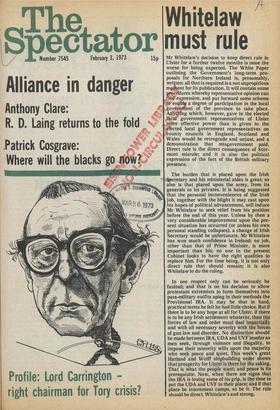Whitelaw must rule
Mr Whitelaw's decision to keep direct rule in Ulster for a further twelve months is none the worse for being expected. The White Paper outlining the Government's long-term proposals for Northern Ireland is, presumably, written: all that is required is a not unpropitious moment for its publication. It will contain some procedures whereby representative opinion can find expression, and put forward some scheme to enable a degree of participation in the local government of the province to take place. Anything which, however, gave to the elected local government representatives of Ulster more effective power than is given to the elected local government representatives on county councils in England, Scotland and Wales would be retrograde and unjust, and a demonstration that misgovernment paid. Direct rule is the direct consequence of Stormont misrule; and it is also the political expression of the fact of the British military presence.
The burden that is placed upon the Irish --..lecretary and his ministerial aides is great; so also is that placed upon the army, from its generals to its privates. It is being suggested that the personal inconveniences of the Irish job, together with the blight it may cast upon his hopes of political advancement, will induce Mr Whitelaw to seek relief from his position before the end of this year. Unless by then a very considerable improvement upon the present situation has occurred (or unless his own personal standing collapses), a change of Irish Secretary would be unfortunate. Mr Whitelaw has won much confidence in Ireland; no job, other than that of Prime Minister, is more important than his; no one in the present Cabinet looks to have the right qualities to replace him. For the time being, it is not only direct rule that should remain; it is also Whitelaw to do the ruling.
In one respect only can he seriously be faulted; and that is on his decision to allow protestant extremists to form themselves into para-military outfits aping in their methods the Provisional IRA. It may be that in hard, practical terms he felt he had little choice. But if there is to be any hope at all for Ulster, if there is to be any Irish settlement whatever, then the forces of law and order must deal impartially and with all necessary severity with the forces of gun law and disorder. No distinction should be made between IRA, UDA and UVF insofar as men seek, through violence and illegality, to impose their minority wills upon the majority who seek peace and quiet. This week's great Harland and Wolff shipbuilding order shows that prosperity for Ulster is there for the asking. That is what the people want; and peace is its prerequisite. Now, when there are signs that the IRA is losing some of its grip, is the time to put the UDA and UVF in their place; and if that place be internment camps, so be it. The rule should be direct, Whitelaw's and strong.


































